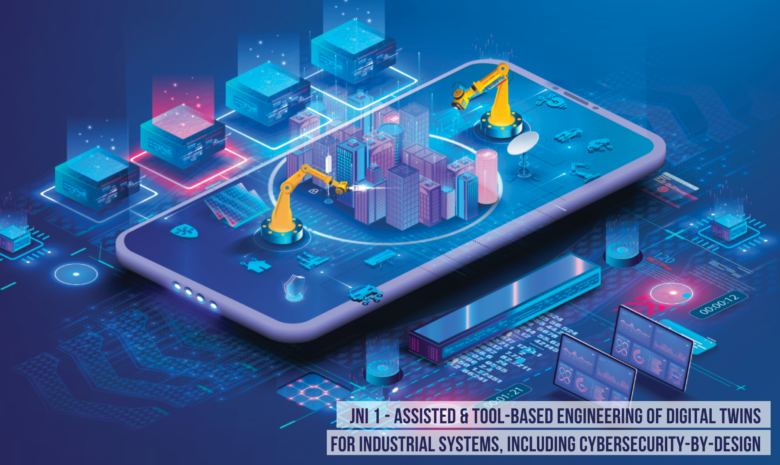Project description
Supporting the adoption of digital twins for industrial systems.
Launched in September 2022 for a 3-year period, JNI1 is the founding project of the entitled “Digital twins for complex industrial systems” programme (Jumeaux numériques des systèmes industriels complexes). It aims to define a tool-based methodological framework to facilitate adoption of digital twins in industrial practices for specific areas and uses cases (predictive maintenance, additive manufacturing, logistics, resilience, etc.), within the context of Industry 4.0.
The tool-based methodological framework strives to rationalize the implementation of digital twins and accelerate their deployment within the industry. It will offer accelerators for the analysis, design, implementation, deployment and operational monitoring of digital twins for complex systems (including the assessment, validation and evolution of the digital twin). It is based on two pillars: a methodological pillar and a technological pillar.
The ambition of the JNI1 project is to develop generic, industry-agnostic methodologies for industrial systems in the broadest sense of the term:
- Equipment and / or machine parks set up in a production system,
- Complex industrial processes,
- Infrastructures associated with the production system (factory, building, networks),
- Supply chain associated with the production system (upstream, downstream and internal to the factory).
The software nature of the digital twin, its coupling with a physical entity and the connections between digital twins, increase the risk of cyber threats on the industrial system. The JNI1 project promotes a cyber-by-design approach linked to the design methodology, offering a building approach that takes into account cyber risks and the integration of fundamental security in the design of the digital twin itself.
One of the ambitions of the project is alsto to promote the interoperability of digital twins and limit the adoption of proprietary solutions in order to avoid software specificities (commercial or open source solutions). The ultimate aim is for digital twins to be interchangeable (with minimal effort and at a lesser cost), and included in standards.
Expected results
- Definition of a tool-based methodological framework for the development, instantiation and deployment of digital twins for complex industrial systems.
- Risk and conformity evaluation in terms of cybersecurity linked to the deployment of digital twins in the context of critical industrial systems.
Targeted markets
The JNI1 project targets a variety of markets: aeronautics, food industry, automotive, building, defence, electronics, energy, rail transportation, naval, metalworking, health, safety, etc.






